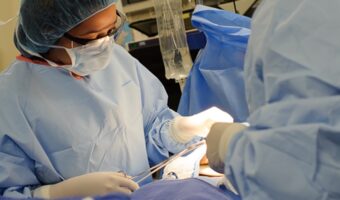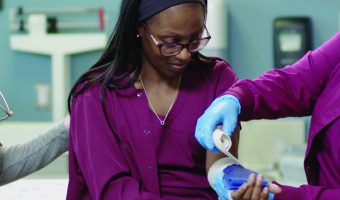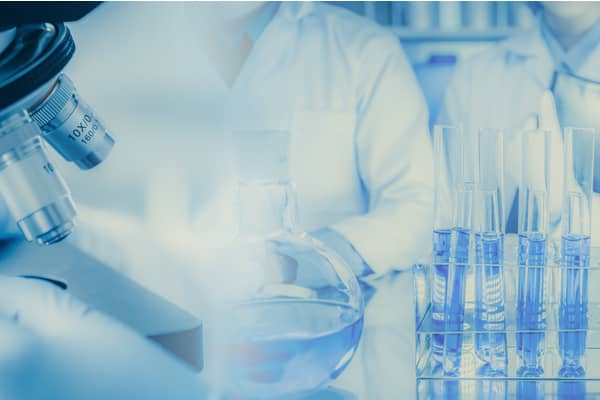Program Overview
TEST Though they work behind the scenes, medical laboratory technicians play a critical role in the healthcare industry. A medical laboratory technician performs clinical laboratory procedures in chemistry, microbiology, hematology, immunology, coagulation, and blood banking.
They also contribute to other areas of the clinical laboratory, expand the information required by a physician to determine the existence and extent of disease, and supervise a patient’s treatment.
The New England Institute of Technology’s medical laboratory technician program empowers students with professional skills and the experience required to serve the healthcare community as a medical laboratory technician (MLT).
Our associate degree program prepares students for roles in clinical settings as technicians in hospital laboratories, diagnostic laboratories, pharmaceutical companies, doctors’ offices, private test centers, or other clinical laboratory facilities.
You will learn the day-to-day operations of the clinical laboratory, perform tests and prepare specimens. You also get extensive training on using basic and specialized medical laboratory technology instrumentation that prepares laboratory personnel to perform medical tests and provide accurate and reliable results that help save lives.
We believe in a hands-on training and learning approach that emphasizes excellence in education. The curriculum combines medical laboratory science courses with clinical experience in hematology, coagulation, microbiology, immunohematology, chemistry, parasitology, immunology, and urinalysis.
Read More Medical laboratory science professionals (also called clinical laboratory technologists or clinical laboratory technicians) are highly skilled laboratory personnel who determine the existence or absence of illnesses and make available data that help physicians decide an appropriate treatment for the patient. The Associate in Science in Medical Lab Technician prepares students as entry-level medical laboratory technicians. Students undergo this training to make a career in health care. We offer medical laboratory science education that empowers students with the experience required to serve the health care community as medical laboratory technicians. We believe in the schools of thought that emphasize excellence in education. Whether working in a medical laboratory, becoming a medical laboratory technician, or working as a technician associate – you’ll gain on-site experience through our associate degree that other medical laboratory technician schools don’t offer. Medical laboratory technicians use basic and specialized laboratory skills, computer technology, and knowledge of the human body to collect samples, analyze body fluids, and provide accurate and precise laboratory results. Doctors and physicians require this information to diagnose, treat and monitor diseases. Be it any work environment like a hospital laboratory or physician’s office lab — you will gain experience using instrumentation that other medical laboratory technician programs don’t offer. Medical laboratory technicians must also demonstrate ethical and moral attitudes and principles to collect samples and process them. They must maintain an attitude of respect for the patient and the confidentiality of the patient’s record and diagnoses at all times. The medical laboratory technician associate degree curriculum offers basic sciences (biology, chemistry, anatomy, physiology), mathematics, social sciences, and the humanities. It provides didactic (including student laboratories) and clinical experience courses in hematology, coagulation, microbiology, immunohematology, chemistry, parasitology, immunology, and urinalysis. Medical laboratory technicians or clinical laboratory technologists can practice general or specialized certification to gain hands-on experience in medical biology or cytotechnology. As you can see, this is one of the most comprehensive lab technician educational programs in Rhode Island that will equip graduates with the necessary skills to perform tests and become medical laboratory technicians. Upon completion of the MLT program, students are eligible to sit for a national certification examination. Clinical laboratory technologists are typically required to complete their bachelor’s degree programs, while technicians usually need an associate’s degree or additional education like postsecondary certificate programs to qualify. Many states require laboratory personnel to get a license, and these licensing requirements will vary from state to state and for different lab specialties. The certification of choice for most employers is through the American Society of Clinical Pathology (ASCP) Board of Certification. As clinical laboratory technologists or medical laboratory technicians, you will:Full Description
What do Medical Laboratory Technicians do?
Potential Career Opportunities for Medical Laboratory Technicians
Studying to become a medical laboratory technician can open you up to a world of possibilities in the fields of medical technology and clinical laboratory science. Careers you can pursue after completing a lab tech program include:
Medical Laboratory Technicians
Biological Technicians
Clinical Laboratory Technicians
Clinical Chemistry Technologists
Medical Technologists
Microbiology Technologists
Immunology Technologists
Clinical Laboratory Technologists
FAQ
-
What Degree Does a Medical Lab Technician Need?
Medical lab technicians usually need an associate’s degree or a postsecondary certificate. In some states, clinical laboratory technologists and technicians require a license. Associate degree programs provide the education and skills required to test blood, medical samples, tissue samples, and other body fluids following the appropriate safety standards.
Students will also be exposed to cell counters, instrumentation, and equipment used in the clinical laboratory. While pursuing the clinical laboratory technologists’ degree course, it is advantageous to do so from an accredited college.
-
Is a Medical Lab Tech a Good Career?
You can find the current statistics on potential salaries and job outlook on the Bureau of Labor Statistics (BLS) website. According to the organization, the median annual wage for clinical laboratory technologists and technicians was $54,180 in May 2020.
The estimated average growth rate or job outlook of clinical laboratory technologists and technicians is faster than the average for all occupations at 11 percent from 2020 to 2030. The statistics also show an average of 25,900 new jobs and job openings for clinical laboratory technologists and technicians each year over the decade.
-
What Is the Difference Between a Medical Lab Technician and a Medical Lab Technologist?
A medical laboratory technician and medical laboratory technologist work in diagnostic laboratories to conduct medical tests, analyze body fluids, and provide physicians with vital diagnostic data. There is a slight overlap between their job responsibilities, and the medical laboratory technician profile varies from that of a medical technologist.
Medical laboratory technicians work with physicians, lab managers, and technologists to perform tests, playing an active role in the diagnosis process, and do not usually interact with patients. On the other hand, the medical technologists prepare samples for examination using specific equipment and perform a vigilant analysis of blood, bodily fluids, and tissues to know the cell count and the chemical composition.
-
What Education Is Needed for Clinical Laboratory Technologists?
Clinical laboratory technologists usually need a bachelor’s degree, whereas technicians need an associate’s degree.





